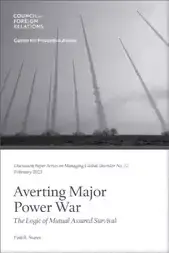- RealEcon
- Israel-Hamas
-
Topics
FeaturedIntroduction Over the last several decades, governments have collectively pledged to slow global warming. But despite intensified diplomacy, the world is already facing the consequences of climate…
-
Regions
FeaturedIntroduction Throughout its decades of independence, Myanmar has struggled with military rule, civil war, poor governance, and widespread poverty. A military coup in February 2021 dashed hopes for…
Backgrounder by Lindsay Maizland January 31, 2022
-
Explainers
FeaturedDuring the 2020 presidential campaign, Joe Biden promised that his administration would make a “historic effort” to reduce long-running racial inequities in health. Tobacco use—the leading cause of p…
Interactive by Olivia Angelino, Thomas J. Bollyky, Elle Ruggiero and Isabella Turilli February 1, 2023 Global Health Program
-
Research & Analysis
FeaturedFollowing a long series of catastrophic misadventures in the Middle East over the last two decades, the American foreign policy community has tried to understand what went wrong. After weighing the e…
Book by Steven A. Cook June 3, 2024
-
Communities
Featured
Webinar with Carolyn Kissane and Irina A. Faskianos April 12, 2023
-
Events
FeaturedJohn Kerry discusses his work as U.S. special presidential envoy for climate, the challenges the United States faces, and the Biden administration’s priorities as it continues to address climate chan…
Virtual Event with John F. Kerry and Michael Froman March 1, 2024
- Related Sites
- More

Centers & Programs
Center for Preventive Action
The Center for Preventive Action (CPA) aims to help policymakers devise timely and practical strategies to prevent and mitigate armed conflict around the world, especially in places that pose the greatest risk to U.S. interests. CPA accomplishes this by commissioning in-depth reports, convening meetings of experts, and consulting with representatives of governments, international organizations, civil society groups, corporations, and the media. The center’s Global Conflict Tracker informs the general public about threats to international peace and security by providing a reliable and regularly updated online source of information about ongoing conflicts.
237,000 are estimated to have died around the world as a consequence of organized armed conflict in 2022
Featured
For CFR’s annual Preventive Priorities Survey, U.S. foreign policy experts assessed the likelihood and impact of thirty potential conflicts that could emerge or escalate in 2024.
Panelists discuss potential and ongoing crises that may erupt or escalate in 2024, as well as their global political implications. This event will explore the results of the 2024 Preventive Priorities Survey, which will be available on CFR’s website on Thursday, January 4, 2024.
The Center for Preventive Action’s Global Conflict Tracker is an interactive guide to ongoing conflicts around the world of concern to the United States.
Vladimir Putin’s grip on power in Russia does not appear as ironclad as it once did. Liana Fix and Maria Snegovaya recommend that the United States prepare for potential leadership change in Moscow and develop response strategies with its allies to mitigate fallout.
The Middle East has suffered from protracted instability in recent decades, and climate-related disasters compound existing suffering. Marwa Daoudy argues that the United States and its partners should center mitigation efforts in assistance to the region.
In Dubai, leaders should focus their attention on policy solutions for vulnerable regions where climate change is amplifying the consequences of armed conflict and compounding failures of governance.
Although no two major powers have openly fought in over three-quarters of a century, growing tensions between the United States, China, India, and Russia threaten renewed conflict. CFR’s Paul B. Stares argues a new logic—“mutual assured survival”—could keep the peace.
The countries on the Bay of Bengal already face some of the world’s most severe natural disasters, and climate change will likely make things worse. Sarang Shidore argues the United States should partner with regional organizations to increase mitigation efforts.
-
Even as the United States debates its role in the Middle East, it still retains significant power and influence in the region. With intensifying great power competition, however, regional dynamics and the prospects for preventing, containing, and mitigating conflicts are shifting. Panelists discuss these topics and possible avenues for cooperation among the major powers. Additional Resources For further reading, please see the CFR discussion paper, "Major Power Rivalry in the Middle East" by Steven A. Cook.
-
Panelists discuss potential and ongoing crises that may erupt or escalate in 2021, as well as their global political implications. This event explored the results of CFR's 2021 Preventive Priorities Survey.
-
In late September 2020, fighting broke out between Armenia and Azerbaijan over the disputed enclave of Nagorno-Karabakh. Although Russia has since brokered a cease-fire, the situation remains very tense and volatile. There are numerous ways the crisis could escalate and become an even larger threat to regional peace and security. Please join our speakers, Ambassador (Ret.) Carey Cavanaugh, professor at the University of Kentucky Patterson School of Diplomacy and International Commerce, and Olesya Vartanyan, senior analyst for the South Caucasus region at the International Crisis Group, to discuss why this conflict matters for the United States and what policy options are available to defuse the crisis. This meeting is made possible by the generous support of the Carnegie Corporation of New York.
-
Since May 2020, an ongoing military standoff between Chinese and Indian troops at various points along the two countries’ disputed border has exposed fracture lines in the China-India relationship and heightened the potential for further military escalation. Even with recent statements around disengaging troops, the standoff proved that rivalry between the two powers could affect the prospects for escalation at the border and elsewhere in the region. Please join our speakers, Tanvi Madan, director of the India Project and senior fellow in foreign policy at the Brookings Institution, and Yun Sun, director of the China program and codirector of the East Asia program at the Henry L. Stimson Center, to discuss these risks and U.S. policy options. This meeting is made possible by the generous support of the Carnegie Corporation of New York.
 Online Store
Online Store




